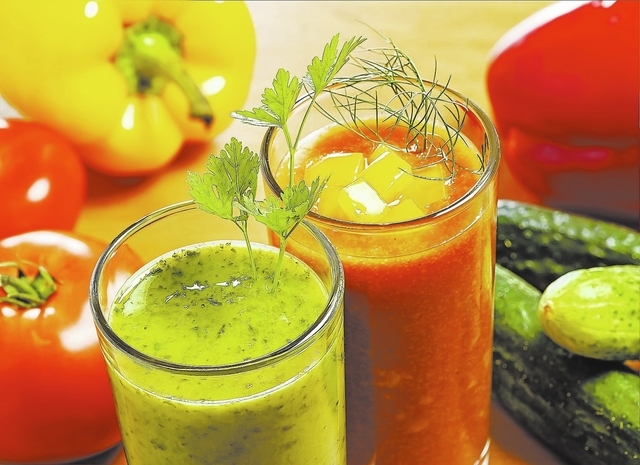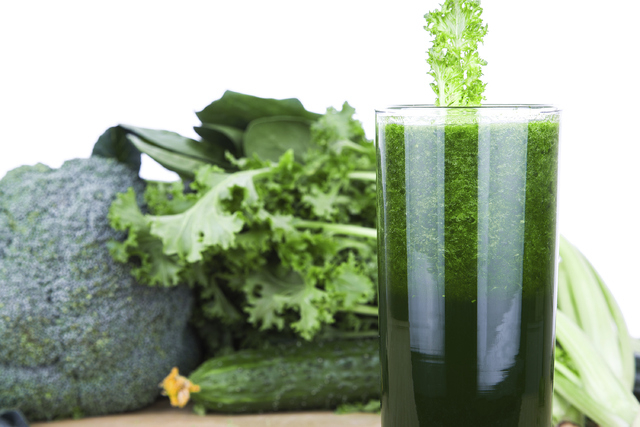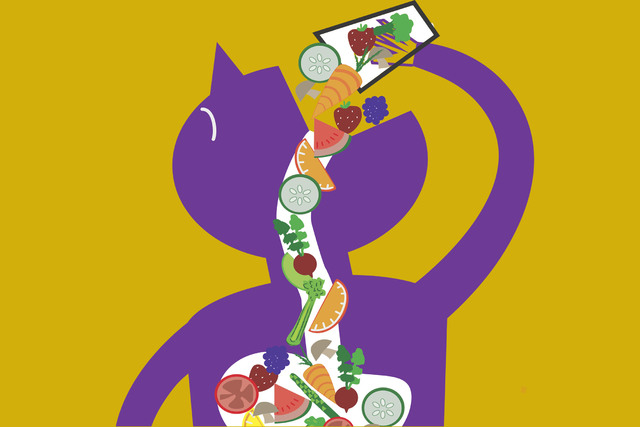Fans say increasingly popular cleansing rituals give bodies fresh start
About once a month, Las Vegas hatha yoga instructor Heather Bruton gives her body what she calls a “yoga cleanse,” an ancient practice of drinking lukewarm water and a little bit of sea salt to clear out the digestive system.
She sets aside a day of rest and drinks several glasses of the saltwater mixture, lets it flush her digestive tract, then, toward nightfall, begins to reintroduce foods such as broth, fresh vegetables and steamed brown rice.
It’s about physically cleansing her body, she said, but also a spiritual practice, a symbolic “letting go” of experiences or issues that may be holding her back.
Bruton, a 42-year-old mom who grew up on the “meat-and-potatoes diet” of her Irish Catholic family, has come to look at cleansing as a lifetime practice. She is a vegan who believes that pure, unprocessed foods are better for her body. When she had cancer four years ago, she used acupuncture to help clear her system of the “heat” from the strong chemotherapy, she said.
“People have to be really careful” with cleansing regimens, Bruton said. “They have to know their body and maybe talk to the doctor they work with … and really understand what they’re doing so that they’re not putting themselves in danger, but also to sort of get a little bit more clarity about what is the purpose of what they’re doing.”
The idea of cleansing the body has been around for centuries, but the recent popularity of what have become known as detoxification, or “detox,” regimens is putting a whole new Westernized twist on an ancient practice.
Unlike Bruton, thousands in this country are adopting the latest regimens without putting much thought into why they are doing it, or their approach.
It’s no wonder. Dozens of books on do-it-yourself juice and raw-food cleanses promise results such as renewed energy and weight loss, not to mention the detox kits, juice packs and supplements at corner pharmacies and vitamin stores.
A web search of “detox products,” for example, will pull up everything from Jillian Michaels’ Detox and Cleanse supplements to the Acai Berry Cleanse that promises to “flush away pounds of matter clogging your digestive system.”
The theory behind the practice is that the body needs help ridding itself of toxins that have built up in tissues and cells because of chemicals in the food supply, the air we breathe, the water we drink. It usually means a fast of some kind, which can be as drastic as an all-liquid diet for several days, or a regimen that limits what someone can eat for a while and adds what are considered healthful, “detoxifying” foods.
Proponents of cleansing report that it is like giving the body a fresh start by balancing the gastrointestinal system so it can function as it should, boosting the immune system, addressing issues such as fatigue, constipation, depression, even fighting disease.
Yet, there isn’t enough science to verify these claims, or to justify whether the body even needs any assistance.
Joy Dubost, a registered dietitian and spokeswoman for the Academy of Nutrition and Dietetics, notes the body already has a “built-in” defense system consisting of the liver, kidneys, gastrointestinal tract, lungs and skin that is more than capable of protecting the body from contaminants as well as disposing of them. Claiming that the body needs help is misleading, she said.
“I think many of these diets kind of play off of a fear factor that our environment is full of chemicals and full of toxins, and therefore we need to rid ourselves of all this exposure to toxins. … Where the problem comes in is there’s absolutely no scientific evidence that your body needs to fast or detox to cleanse itself from toxins,” Dubost said.
Because of limitations it can place on consuming certain food groups, such as protein, with specific nutritional benefits, detoxification can cause symptoms such as cramping, aching muscles, lethargy, muscle loss and heart issues.
The digestive cells that line the intestine are “the most rapidly turning over cells of the body” so that even if a contaminant gets absorbed chances are it will eventually get sloughed off, said Miriam Een, assistant professor with the Department of Family Medicine, University of Nevada School of Medicine.
The elderly are among the most vulnerable when it comes to detoxification practices, because they are more prone to dehydration and may have more chronic diseases that could be exacerbated by the drastic change in diet, said Een, who is also a registered dietitian.
Also at risk are women who are pregnant or trying to conceive.
“One (detox regimen) that particularly bothered me was a fertility cleanse, and I thought, ‘Oh wow, that’s not a time when you want to be putting yourself in a potential nutrition risk,’ ” Een said.
Teens are also vulnerable to the effects of cleansing practices because they are still growing and often lead very active lives, including participation in school sports, which means they need plenty of daily nutrition.
It’s not uncommon for teens to use some of the more extreme cleansing programs to lose weight, putting them even further at risk, Een said. This includes the lemonade diet, also known as the Master Cleanse, which consists of no solid food, just a concoction of water, lemon juice, maple syrup and cayenne pepper for several days.
Detox regimens can also set teens up for future eating disorders, she said.
Herbal supplements are often part of detoxification practices, but they are not regulated by the government and can have harmful side effects, especially when mixed with traditional medications, Een said.
Also, many see cleansing as a way to lose weight, the idea being that weight loss will become easier once toxins are flushed from the body; but there is no proof that this is true, according to the experts. Those who lose pounds on these regimens are usually shedding water weight and are likely to gain it right back, or they may even be dipping into their protein stores and end up losing lean muscle, Een said.
For Jason Allen, a doctor of naturopathic medicine and clinical research assistant professor with Bastyr University near Seattle, the issue of detoxification is not as clear-cut and there is more to learn.
Allen is conducting research on human detoxification of environmental chemicals, work that is being partially funded by the National Center for Complementary and Alternative Medicine of the National Institutes of Health.
He noted that more than 80,000 chemicals are registered for commercial use in the United States and only a portion have been properly tested for toxicity to humans.
Allen regularly sees patients with symptoms of chemical sensitivity, including headaches, nausea and fatigue, whether it’s from exposure to common, everyday products such as cleaning agents or “acute high-level exposure to toxic chemicals in the workplace.”
“For individuals who are exquisitely sensitive to common exposures, are suffering from chronic conditions potentially associated with acute or chronic environmental exposures, more advanced detoxification can be very beneficial,” Allen said.
Anyone interested in intensive detoxification programs, however, should consult with a health care provider “with the experience and skills to guide them through a program,” he said.
There are integrative medicine practitioners trained in environmental medicine and detoxification, for example, and people can learn more about this through organizations such as the American Association of Naturopathic Medicine and the American College for Advancement in Medicine.
For most of us, however, maintaining a healthy body can simply be a matter of making good lifestyle choices, such as not smoking, decreasing caloric intake, getting enough sleep, choosing healthful foods and exercising regularly.
A lot of Americans don’t consume enough water or fiber, which aid in the excretion of toxicants, Allen said.
“Many contaminants are stored in body fat tissue. … There’s some really interesting data, for example, on Seventh-day Adventists who are vegetarian and they have fewer contaminants in their blood and live longer than nonvegetarians.”
Elements of some of the detoxification practices can be used now and then without going to extreme measures. One example is regularly drinking smoothies made from fresh fruits and vegetables, adding fiber from flax or psyllium seeds, and beneficial Omega-3 oils, which aid in the absorption of nutrients.
Fresh fruits and vegetables, required in many detox regimens, also contain antioxidants that protect the body from cell-damaging effects of free radicals, and can lower the risk of diseases such as heart disease and cancer, according to experts.
In the end, Een said, looking at the practice of detoxification as a whole, including the barrage of products and the opinions of everyone from the clerk at the vitamin store to the latest celebrity-endorsed best-seller, the best approach seems to be one of caution.
“There are some positive things that people may be doing when they start to do a detox diet where they may have otherwise been eating foods that are not nutrient dense. … But it’s kind of the whole, you know, everything else that would come with it, the other behaviors they may choose to do as well, that may not have the best effects.”




















